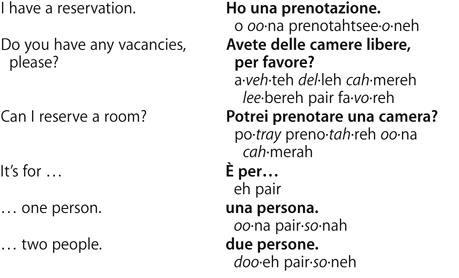
• If you want hotel-type accommodations, look for the following signs.
Hotel
Albergo
Motel (Two major motel chains are run by ACI and AGIP.)
• Hotels are divided into five classes (from luxury to tourist class), and pensioni (boarding houses) into three classes.
• Lists of hotels and pensioni can be obtained from local tourist offices or from the Italian National Travel Office (see p. ix).
• Since the price is displayed in the room itself, you can check it as you are looking at the room before agreeing to stay. The displayed price is for the room itself—per night, not per person. Breakfast is extra and therefore optional.
• Service and VAT (value-added tax) are always included in the price of the room, so tipping is optional.
• Other than breakfast, not all hotels provide meals. A pensione always provides meals. Breakfast is continental-style: coffee or tea, with rolls and jam.
• Some form of identification, like a passport or driver’s license, is requested when registering at a hotel; the ID is normally kept overnight.
• To ask directions to a hotel, see p. 11.

For numbers, see p. 113.
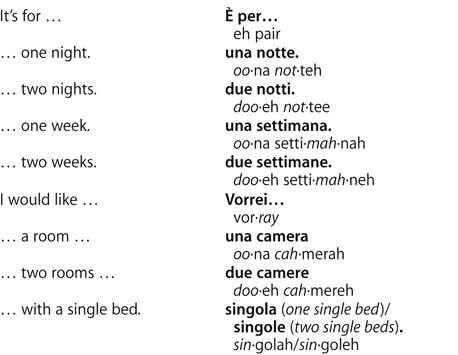
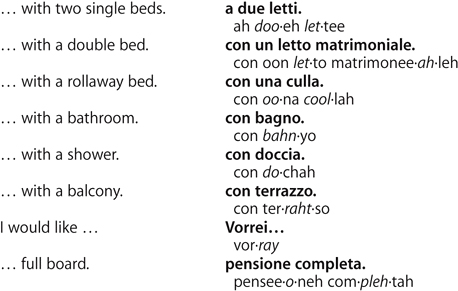
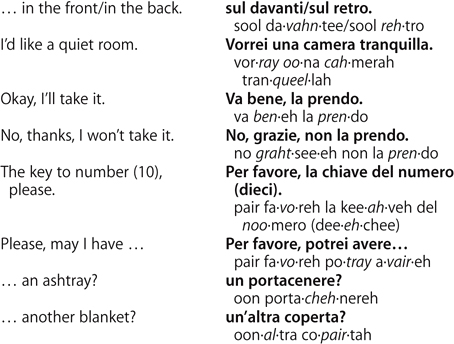
For telling time, see p. 115.
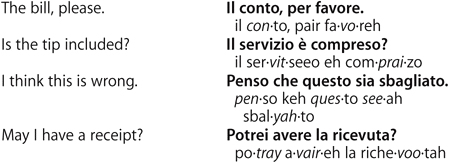
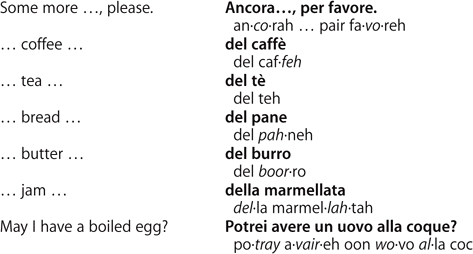
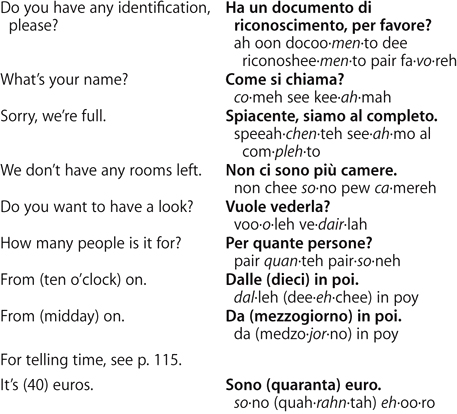
For numbers, see p. 113.
• Look for the word Camping or Campeggio or the sign below.
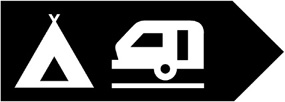
• Be prepared to pay:
per person
for the car (if applicable)
for the tent or the trailer space
for electricity
for a hot shower
• You must provide proof of identity, such as your passport.
• You can obtain lists of campsites from local tourist offices (see p. 14) or from the Italian National Travel Office (see p ix).
• To rent a space in advance (particularly recommended in July and August), write to the Centro Internazionale Prenotazioni Campeggio, Casella Postale 23, 50041 Calenzano, Italia.
• Some campsites offer discounts to campers with the International Camping Carnet (an ID card that provides access to campgrounds controlled by clubs that belong to one of several international travel associations).
• Camping off-site is permitted except in state forests and national parks. It is always best to ask permission from the landowner.
• Look for the words Ostello per la Gioventù or the sign at right.
• You will be asked for your Youth Hostels Association (YHA) card and your passport upon arrival.
• You will have to rent sheets on arrival.
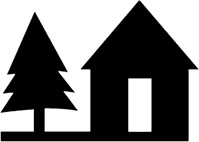
• Food and cooking facilities vary from hostel to hostel, and you may have to help with domestic chores.
• In peak season it is advisable to book beds in advance; your stay will be limited to a maximum of three consecutive nights per hostel.
• Apply to the Italian Tourist Board (E.N.I.T.) or to the local tourist office in Italy (see p. 14) for lists of youth hostels and details of regulations for hostelers.
• For buying or replacing camping equipment, see p. 41.
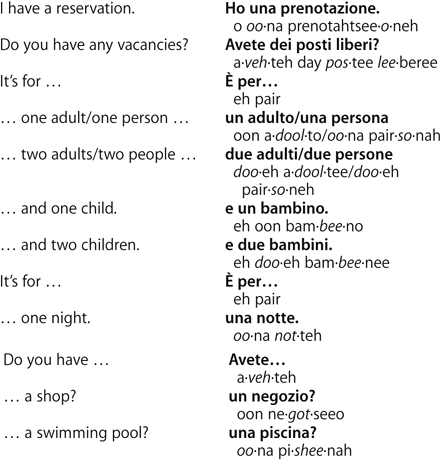
For food shopping, see p. 47.
For eating and drinking out, see p. 66.
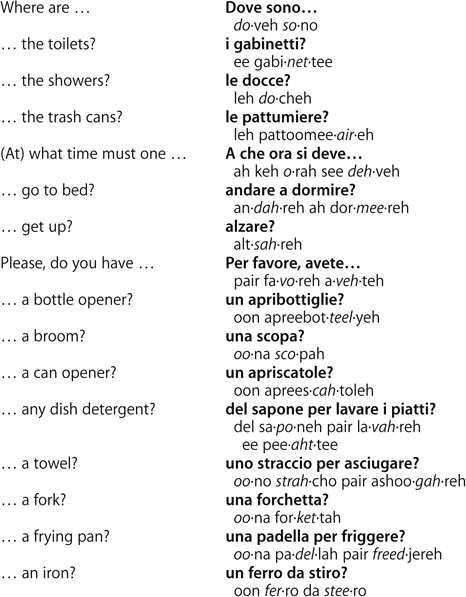
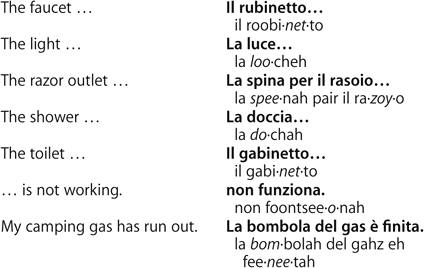
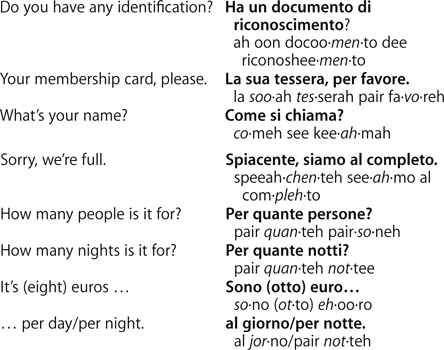
For numbers, see p. 113.
• If you are looking for lodging to rent, look for the following words in advertising and on signs.

• For arranging details of your rental, see “Hotel,” p. 16.
• If you rent on the spot, you need to know the following words.

• Having arranged your accommodation and arrived with the key, check the basic amenities that you take for granted at home.
• Electricity: Voltage? You may need an adapter for razors and small appliances brought from home.
Learn how to turn the lights on and off.
• Gas: Municipal (natural) gas or bottled gas? Butane gas must be kept indoors, and propane gas must be kept outdoors.
• Stove: Don’t be surprised to find the grill inside the oven (or no grill at all); a lid covering the burners that lifts up to form a backsplash; or a mixture of two gas burners and two electric burners.
• Toilet: Sewer drainage or septic tank? Don’t flush disposable diapers or similar materials down the toilet if you have a septic tank.
• Water: Locate the shut-off valve. Check the faucets and plugs—they may not operate the way you are used to.
• Windows: Learn how to open and close windows and shutters.
• Insects: Is an insecticide spray provided? If not, buy one.
• Equipment: See p. 41 for buying or replacing equipment.
• You will probably deal with a real estate agent, but find out whom to contact in an emergency; it may be a neighbor who is renting the lodging to you.
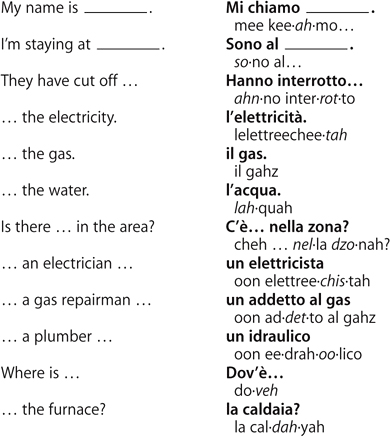
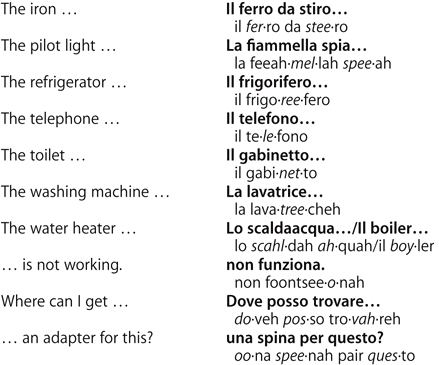
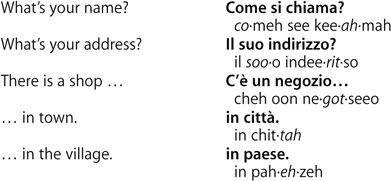
For days of the week, see p. 117.